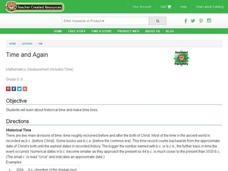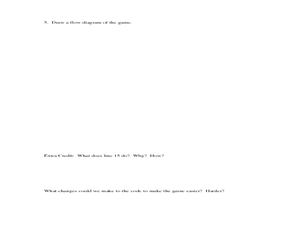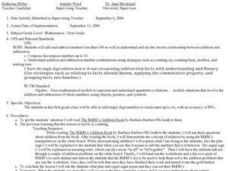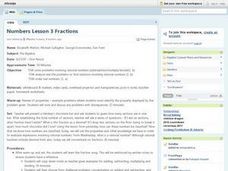West Contra Costa Unified School District
Solving Equations with Variables on Both Sides
So many different ways to solve equations, so little time! Scholars learn how to solve equations with variables on both sides by using several different methods. They apply bar models, decomposition, and traditional algebraic methods to...
Curated OER
Time and Again
Students examine historical time and make time lines. They study the two main divisions of time; the time before and after the birth of Christ. They also note that time lines are a way of illustrating the length of historical time.
Curated OER
Everything was Up to Date in 1628
Students examine the life and lifestyles of New England colonists in the year 1628, and then investigate what life was like in their own area during the same time period. They watch segments from the PBS hands-on history series COLONIAL...
Curated OER
Making Cookies- How many per hour?
Fifth graders measure how long it takes to make cookies. In this measuring time lesson, 5th graders explore how to manage time. Students decide when to start making breakfast on time, how to calculate playing time into their lunch time,...
Curated OER
Introduction to Hours & Minutes
First graders identify, interpret, and gain proficiency in using a clock to tell time to the hour and determine how many minutes are in an hour. They identify and list what they do as they travel through their dayand how much time you...
Curated OER
How Does Your Garden Grow?
Students construct and maintain a school garden. In this gardening lesson, students plan the construction of the garden by writing letters to local businesses asking for supplies and materials; students build the garden using their math...
Curated OER
Graphing Calculator Investigation - Second Degree Polynomial Functions
Young scholars solve quadratic functions. In this solving quadratic functions lesson, students determine the height of an object at a given time. Young scholars determine the time at which an object hits the ground. Students answer...
Curated OER
Half Hour Time
In this math worksheet, learners fill in the time for half hour intervals. They use the pictures of clocks to fill in the hour and second hands.
Curated OER
Time: Quarter Hour
In this math literacy worksheet, students find the right times for the fifteen minute intervals. They fill in the times for the clocks with the hour and minute hands.
Curated OER
Carbon Dating
Simulate C-14 decay using M&M and Reese's Pieces candies. In this scatter-plot lesson, high schoolers perform an experiment to simulate the half life of C-14. Information is plotted on a scatter-plot. Students answer four...
Curated OER
Teaching Radioactive Decay: Radioactive Half-life And Dating Techniques
Learners generate a radioactive decay table for an imaginary element using a box filled with pinto beans and M&M's. They use their data to plot a decay graph, develop the concept of half-life, and use the graph to "age" several samples.
Curated OER
TI Math, Games
Students solve problems using technology. In this algebra lesson, students apply flow diagrams and computer codes to solve problems. They use the TI to view the graphs.
Curated OER
Earth's Age: The Dating Game
Students conduct a simulation to determine radioactive decay and half-life. Using pennies, dice or sugar cubes as isotopes placed in shoe boxes simulating rocks, they hold five trials representing 1000 years each to find the theoretical...
Curated OER
Square Roots Using a Carpenter's Square
Students calculate the square root of a given number using carpenter's square measurements. In this math lesson, students relate this method on the Pythagorean theorem. They answer practice problems after the exploration activity,
Curated OER
How Much Will That House Cost?
What is a mortgage and how do you use it to pay for a house? Young financiers determine how much money is actually spent paying a mortgage payment on a home. They use their math skills to calculate monthly payments on a home given a 30...
Curated OER
Volume of a Rectangular Prism
Children use the length, width, and height of an object to calculate the volume of a rectangular prism. They observe how to multiply three numbers at a time, and define volume. Pupils observe as the teacher demonstrates how to determine...
Curated OER
M & M Addition
Eat your math manipulatives, are you serious? Yup, Learners listen to the story The M & M's Addition book, add single digit numbers to reach sums up to six, and demonstrate addition and subtraction number combinations using several...
Curated OER
Children's Literature Across the Curriculum Ideas-If You Made A Million
Pupils read If You Made A Million by David M. Schwartz. They complete a variety of cross-curricular activities surrounding the study of earning, saving and spending money. Included are reading, art, math, science, writing, social...
PB Works
Numbers Lesson 3 - Hershey Bar Fractions
Talk about delicious math! Pupils solve problems involving rational numbers and analyze real-life problems to find solutions in a pre-algebra class. They discuss the sections of a Hershey's bar in terms of fractions and decimals before...
Curated OER
Assessment & Evaluation
Seventh graders study elapsed time, radioactive decay and half-life. In this time machine lesson plan students complete several activities and view a presentation.
Curated OER
Exponential Decay
Students study exponential decay and its application to radiocarbon dating. In this exponential decay lesson, students use candy to model the time it takes for something to decay. Students also graph the data they collect and...
Curated OER
Count Down the Days to a Special Event
Students calculate time using a grade appropriate skill. In this time activity, students calculate the time to a special event. Students calculate days, months, weeks, hours, minutes or seconds depending on their skill level....
Curated OER
Fraction Clocks
First graders use a clock to practice telling time and using fractions. They review the different parts of the clock and play a game using time. They help each other with telling time.
EngageNY
How Do Dilations Map Angles?
The key to understanding is making connections. Scholars explore angle dilations using properties of parallel lines. At completion, pupils prove that angles of a dilation preserve their original measure.

























